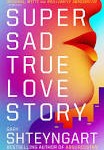Accumulating Fictions
by Peter Hitchcock
“The economic turmoil of 2007–2008 is not over: the Great Recession has a long tail that reaches into the present at every level of the economy and is of much interest to those of us attempting to think through its cultural resonance. In the wake of the ‘financial meltdown’ important lessons emerge in the space between literature and the economy. These lessons concern problems of velocity, fiction, and the subject: the complex speed of transactions, the fictiveness of fictitious capital, and the sublation of the subject in contemporary capital accumulation. Dark pools, for instance, the invisible devices at the core of this essay, form a liquidity mechanism meant to achieve efficiencies beyond the excesses that produced the crisis, particularly beyond the effulgence of regulation intended to address them. Just as British Petroleum’s response to the Deepwater Horizon oil spill has involved even more drilling in the Gulf of Mexico, so finance capital is compelled not to surrender its deleterious modes of accumulation but to expand them. Every fact of economic harm becomes a fiction of anticapitalism, and every element of fictitious capital accumulation divulges the real of economic relations: the accumulation of fiction.”
So begins Peter Hitchcock‘s essay examining both the nature of the economic crisis of 2007–2008 and the intensification of finance capital in its wake. Moving between aesthetics and economics, Hitchcock considers, in particular, the emergence of the “dark pool” and its implications within a massive expansion of fictitious capital.
This essay is from Representations‘ current special issue Financialization and the Culture Industry. The introduction to the issue by C. D. Blanton, Colleen Lye, and Kent Puckett, is available online free of charge.





